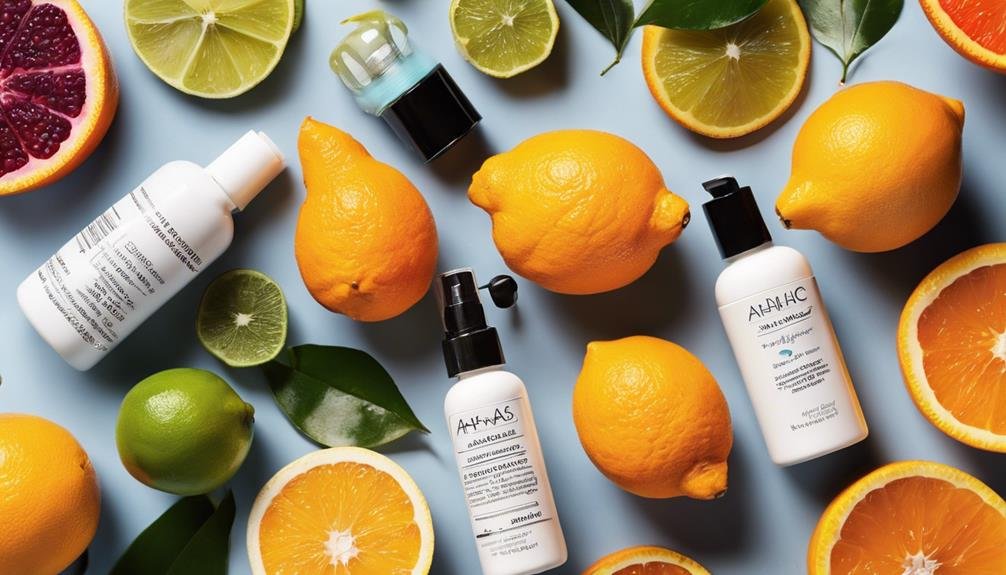"Cherishing Little Steps - A Haven for Baby and Family Journeys"
Best Skincare Ingredients for Glowing Skin
If you've ever struggled with dull skin, imagine the difference it could make to incorporate the right skincare ingredients into your routine. Picture waking up to a complexion that looks effortlessly radiant and healthy, without the need for heavy makeup or filters. By understanding how key ingredients like Hyaluronic Acid, Vitamin C, Retinol, Niacinamide, and AHAs can transform your skin, you're on the path to achieving that coveted glow. But wait, there's more to explore beyond these popular choices – let's uncover the next level of skincare ingredients for your journey to luminous skin.
Hyaluronic Acid
When it comes to achieving that coveted glowing skin, one ingredient stands out for its hydrating and plumping properties: hyaluronic acid. This powerful molecule is a humectant, meaning it attracts and retains moisture, keeping your skin hydrated and supple.
Hyaluronic acid benefits go beyond just hydration; it also helps to smooth out fine lines and wrinkles by plumping up the skin.
Incorporating hyaluronic acid products into your skincare routine can make a significant difference in the overall appearance and health of your skin. Look for serums, moisturizers, and masks containing hyaluronic acid to reap its full benefits. These products can help to restore moisture, improve elasticity, and give your skin that coveted radiant glow.
Whether you have dry, oily, or combination skin, hyaluronic acid is a versatile ingredient that can benefit almost everyone. So, if you're aiming for hydrated, plump, and youthful-looking skin, hyaluronic acid might just be your new best friend.
Vitamin C
Vitamin C is a potent antioxidant that plays a crucial role in skincare. This powerhouse ingredient offers a multitude of benefits for your skin, from brightening and evening out your complexion to protecting against environmental stressors. When it comes to application techniques, incorporating a vitamin C serum into your daily skincare routine can make a significant difference. Apply a few drops onto clean skin before moisturizing, making sure to follow up with sunscreen to maximize its benefits.
Here's a helpful table to guide you through Vitamin C:
| Benefits | Application Techniques | Product Recommendations | DIY Recipes |
|---|---|---|---|
| Brightens skin tone | Apply serum before moisturizer | Drunk Elephant C-Firma Day Serum | Homemade Vitamin C serum using L-ascorbic acid powder |
| Fades dark spots | Gently massage into skin | Paula's Choice C15 Super Booster | DIY Vitamin C face mask with honey and yogurt |
| Boosts collagen production | Use in the morning for best results | SkinCeuticals C E Ferulic Serum | Vitamin C-infused toner with green tea and witch hazel |
| Protects against UV damage | Follow with sunscreen | Sunday Riley C.E.O. Vitamin C Rich Hydration Cream | DIY Vitamin C eye cream with shea butter and coconut oil |
Integrating Vitamin C into your skincare regimen can help you achieve that radiant, glowing skin you've always dreamed of.
Retinol

To further enhance your skincare routine and continue on the path to radiant skin, let's now explore the benefits of incorporating retinol.
Retinol, a derivative of vitamin A, is a powerhouse ingredient known for its ability to promote skin cell turnover, improve collagen production, and reduce the appearance of fine lines and wrinkles. By incorporating retinol into your skincare regimen, you can achieve smoother, more youthful-looking skin with a radiant glow.
When using retinol, start with a low concentration to allow your skin to acclimate gradually. Apply it at night to avoid sensitivity to sunlight, and always follow up with a moisturizer to keep your skin hydrated.
While retinol offers numerous benefits, it can also come with potential side effects such as dryness, redness, and peeling. To minimize these effects, use retinol sparingly at first and gradually increase frequency as your skin adjusts.
It's important to wear sunscreen daily when using retinol to protect your skin from increased sensitivity to the sun. By incorporating retinol into your skincare routine with care and caution, you can enjoy its transformative effects on your skin.
Niacinamide
Niacinamide, also known as vitamin B3, is a versatile skincare ingredient that offers a wide range of benefits for achieving healthy and radiant skin. Incorporating niacinamide into your skincare routine can help improve the skin's barrier function, enhance its moisture-retention capabilities, and reduce inflammation. This powerhouse ingredient is suitable for all skin types, including sensitive skin, making it a popular choice for many.
The benefits of niacinamide extend beyond hydration and soothing properties. It also helps brighten the skin, fade hyperpigmentation, and minimize the appearance of pores. When used consistently, niacinamide can contribute to a more even skin tone and a smoother complexion. Plus, it plays well with other skincare ingredients, making it easy to incorporate into your existing routine.
While niacinamide is generally well-tolerated, some individuals may experience mild irritation or redness. To minimize the risk of side effects, start with a lower concentration and gradually increase usage. When selecting products, look for serums or moisturizers with a concentration of 5% or higher for optimal results.
Some recommended products containing niacinamide include:
- The Ordinary Niacinamide 10% + Zinc 1%
- Paula's Choice Niacinamide Booster
- CeraVe PM Facial Moisturizing Lotion
AHAs

Rich in natural exfoliants, AHAs, or alpha hydroxy acids, are powerful ingredients that can transform your skincare routine. AHAs offer numerous benefits for achieving glowing skin. Here's how you can make the most of them:
- Exfoliation Benefits: AHAs work by gently exfoliating the skin, removing dead cells and promoting cell turnover, resulting in a brighter complexion.
- Optimal Usage: Start with a lower concentration to allow your skin to adjust, then gradually increase frequency. Avoid over-exfoliation.
- Combining with Sunscreen: Due to increased sensitivity to the sun, it's crucial to wear sunscreen daily when using AHAs to prevent sun damage and maintain skin health.
- Daily Routine Integration: Incorporate AHAs into your nighttime skincare routine to avoid potential conflicts with other products and allow them to work effectively overnight.
- Consultation: If you're unsure about how to incorporate AHAs into your routine, consider consulting a dermatologist for personalized advice.
Peptides
How do peptides contribute to your skincare routine? Peptides are small chains of amino acids that play a vital role in maintaining skin health. They are known for their ability to boost collagen production, which is crucial for keeping your skin firm, smooth, and youthful. By stimulating collagen synthesis, peptides help in reducing the appearance of fine lines and wrinkles, making them a popular choice for anti-aging skincare products.
Below is a table highlighting the key benefits of peptides in skincare:
| Benefits of Peptides | Description |
|---|---|
| Collagen Production | Peptides promote collagen synthesis, leading to improved skin elasticity and firmness. |
| Anti-Aging Benefits | Peptides help in reducing the signs of aging by diminishing fine lines and wrinkles. |
Including peptides in your skincare routine can help you achieve a more radiant and youthful complexion. Look for products containing peptides to enjoy these skin-loving benefits.
Antioxidants

Antioxidants are essential components in skincare that play a crucial role in protecting your skin from environmental stressors and free radicals. These powerful compounds offer a range of benefits for your skin health, helping to combat signs of aging and maintain a radiant complexion. Here's how you can incorporate antioxidants into your routine:
- Benefits of antioxidants in skincare:
- Neutralize free radicals
- Reduce inflammation
- Improve skin tone and texture
- Enhance skin's defense against UV damage
- Boost collagen production
To amp up your antioxidant intake, consider adding these top antioxidant-rich foods to your diet:
- Berries
- Dark leafy greens
- Nuts and seeds
- Green tea
- Carrots
When it comes to skincare products, you may choose between antioxidant serums and creams. Serums are lightweight and penetrate deeply, while creams provide added hydration and protection. Experiment to find what works best for your skin type and concerns.
Frequently Asked Questions
Can I Use Multiple Skincare Ingredients Together?
Yes, you can use multiple skincare ingredients together. However, when layering products, be cautious of ingredient interactions. Some combinations may enhance benefits, while others could cause irritation. Patch test new combinations to ensure compatibility for glowing skin.
Are There Any Common Side Effects of Using These Ingredients?
Using multiple skincare ingredients can lead to potential allergies or reactions. However, the long-term benefits of combining these ingredients often outweigh the risks. It's essential to patch test new products and consult a dermatologist if concerns arise.
Can These Ingredients Be Used on All Skin Types?
Yes, these ingredients can typically be used on all skin types, but it's important to consider ingredient compatibility and skin sensitivity. Patch testing new products is a great way to ensure they work well for you.
Is It Safe to Use These Ingredients During Pregnancy?
During pregnancy, ingredient safety is crucial in skincare. Always ensure compatibility with your routine. Many common skincare ingredients like retinoids should be avoided. Consult your healthcare provider for guidance on safe alternatives for glowing skin.
How Long Does It Take to See Results From These Ingredients?
Results from skincare routines vary based on your skin's response. Typically, noticeable changes in product effectiveness can be seen within a few weeks. Consistency is key for optimal outcomes. Patience and adherence to your routine are essential for glowing skin.
Conclusion
In conclusion, incorporating key skincare ingredients like Hyaluronic Acid, Vitamin C, Retinol, Niacinamide, AHAs, Peptides, and Antioxidants into your routine can help you achieve that coveted glowing complexion. Remember, "the proof is in the pudding," so give these ingredients a try and watch your skin transform. With consistent use and proper application, you'll be well on your way to radiant, healthy skin that will make heads turn.




